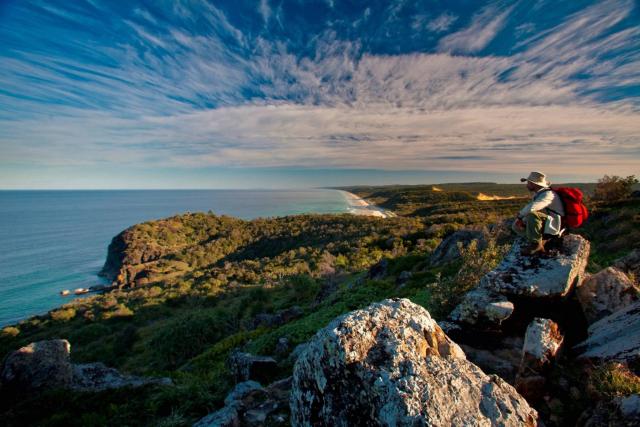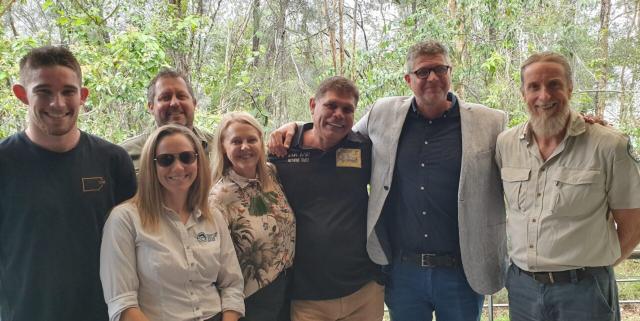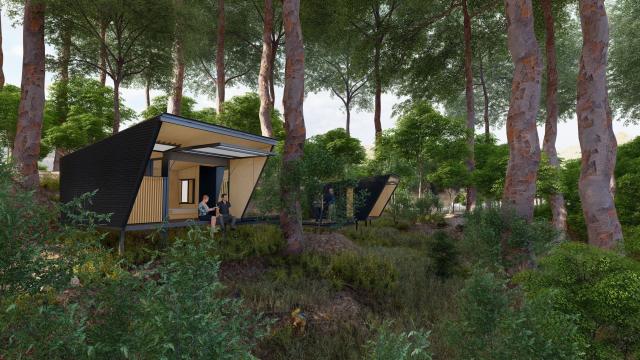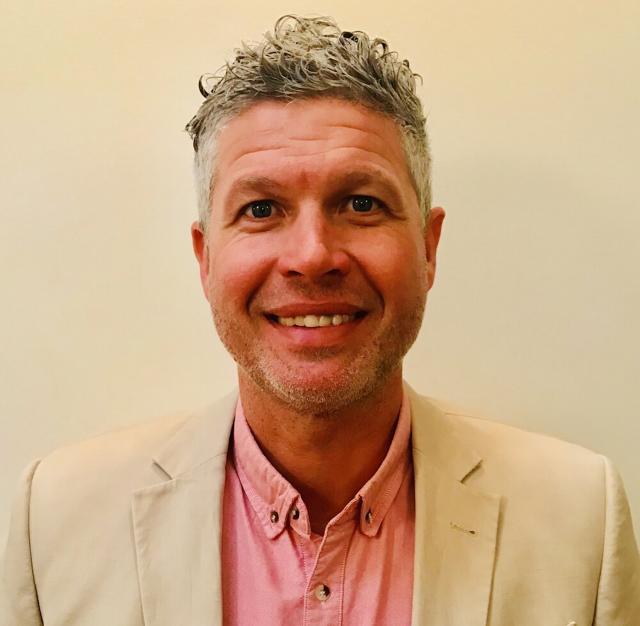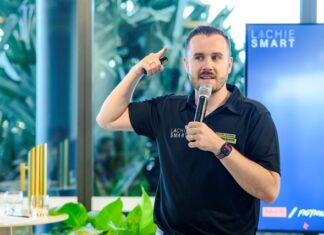More than a month after the conclusion of a Cooloola Indigenous Land Use Agreement (ILUA) between the Queensland government and the Kabi Kabi Aboriginal Peoples Corporation, progress on the long-awaited Cooloola Great Walk ecotourism venture still proceeds at what could generously be described as snail’s pace, but the man behind the project’s successful commercial proponent is perhaps the least concerned of anyone in the complex web of stakeholders and government departments.
Michael Lamprell, chief executive officer and founder of ecotourism operator and creator CABN, told Noosa Today this week: “To be honest, putting a timeline for completion on the Great Walk is just not the way we operate. We are broadly focused on the bigger picture of what the future looks like for Kabi Kabi, the programs we’re building with them, the broader opportunities for capacity-building, tourism training and much, much more.”
The ILUA is not necessarily a green light for the Cooloola Great Walk, but as Noosa MP Sandy Bolton noted in her informative column in this paper last week, it is a major step forward. At the same time, opposition to the project seems to have become confined to a couple of fringe social media sites, while misinformation as to the size and scope of the Great Walk is diminishing too.
More generally, the catchcry and call to arms of its opponents has pretty much devolved down to the so-called cardinal principle, which does not prohibit commercial projects in national parks but rather defines what is allowable.
In a wide-ranging exclusive interview with Noosa Today, Mr Lamprell outlined the status of the Walk in progress.
NT: The Indigenous Land Use Agreement for Cooloola was signed more than a month ago, so I’m wondering what you can report on the Great Walk moving forward? Sandy Bolton says in a recent column that the Kabi Kabi fact sheet from the Department of Resources seems to be holding things up.
Michael Lamprell: I can’t speak to that document you refer to, although I know that Kabi Kabi have been communicating with their broader community on this project for years now, but from CABN’s perspective, since the signing of the ILUA we are now working closely with Kabi Kabi and the state to work through the next stages of our detailed design of what each site will look like. It’s a matter of finalising those requirements for us to get an agreement in place with the state and then go into the next stage of planning and approvals with the relevant councils and other departments.
NT: So is there a timeline for completion now?
ML: We have internal planning documents with timelines attached, but the environment is so dynamic, there are so many factors that are out of our control that it would be irresponsible to put a definitive timeline on it. To be perfectly honest with you, it doesn’t really matter whether it’s the Cooloola project or our projects in other states and territories, it’s not the way we really look at it.
NT: Reading between the lines, the commercial reality is you have a timeline but it’s not politic to reveal it?
ML: Only because it might be misleading due to the fact that there are always mitigating factors that are out of our control. As I said before, I know that the communication process within the broad Kabi Kabi community is ongoing, and I attended one of those meetings in the earlier stages, a community forum where, having received the latest update on the project, they were given the opportunity to discuss and ask questions. If the outcome of that process is a fact sheet, then I’m not aware of it, but it would seem logical after such extensive consultation about our partnership.
NT: Lately the main claim of the opponents of the CGW seems to be that the claimant group does not speak for the broader community and that the broader community does not want it to proceed. Sandy Bolton has said in the parliament that she would withdraw her support unless there was broad agreement amongst Kabi Kabi. Any movement on this from your side?
ML: Again, I can only speak to what I know from the Kabi Kabi people we work closely with on this project, but I will say that it doesn’t matter what organisation or community you deal with, it is never possible to get complete agreement from every member. The representatives of Kabi Kabi that we have established a strong understanding and working relationship with are incredibly supportive of the partnership and of the opportunities that it’s going to create for their community generally in the short and long term. In terms of the broader community, it’s clear that there are different factions but I’m not involved so I can’t comment. But I think it’s important to note that the people we work with are not just supportive of the CGW project alone. They are supportive of the programs that we’re building with them, and with our partners Intrepid on capacity-building. That is a really strong element of this.
NT: Correct me if I’m wrong on this, but I understand that CABN has already made concessions to environmental and cultural opposition on some of the proposed campsites, notably Poona Lake.
ML: Firstly, yes, you are correct on Poona, changes have been made, but we don’t see any of these as concessions. It’s just part of collaboration, and we’ll continue to work closely with Kabi Kabi and all stakeholders to refine what is the best outcome for the park, the environment and the guest experience. That has been an ongoing process on every aspect, every touchpoint of this project, not just on Poona Lake. This is not widely known or much publicised, but we’re very proud of it.
NT: Well, one particular touchpoint that has been mentioned in despatches is Double Island Point and the size of the proposed campsite planned there. Is there an ongoing collaboration on that?
ML: Yes, but there is on every site. Double Island Point is no different than any other aspect of the partnership. We’re working together to find improvements on all of them, over a whole host of issues, including impact, placement and experience. It’s really important to us to keep the focus on the broader goals of the partnership. I know there’s a sentiment out there that you fight us on one site and then move to the next, but we don’t see it that way at all. We take a holistic approach.
NT: Is it working? Is opposition to the Great Walk receding as information slowly becomes available?
ML: The best way for me to answer this is that I’m so focused on what we need to do with Kabi Kabi and the next stages of the project I’m not really looking at the other stuff. Our shared vision with Kabi Kabi, when executed, will show that we’ve taken the right steps from the start and will continue to do so. I’d like this project to draw attention to the whole environment of the Cooloola coast in a positive way and I think we can help in education and protection.

